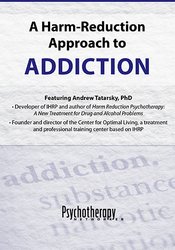

More than one-third of Americans struggle with problematic substance use and other risky or addictive behaviours, but they often have a great deal of ambivalence about changing them.
Even with clients whose issues are mild on the severity spectrum, it’s difficult getting to the heart of the complex reasons, unique to each person, for this roadblock to change.
This workshop offers a comprehensive psychobiosocial model for understanding and working with these behaviours through Integrative Harm Reduction Psychotherapy (IHRP), which can be immediately incorporated into your practice.
| File type | File name | Number of pages | |
|---|---|---|---|
| Manual - A Harm-Reduction Approach to Addictions (1.9 MB) | 20 Pages | Available after Purchase |

Andrew Tatarsky, PhD, is developer of IHRP and author of Harm Reduction Psychotherapy: A New Treatment for Drug and Alcohol Problems. He’s founder and director of the Center for Optimal Living, a treatment and professional training center based on IHRP.
Speaker Disclosures:
Financial: Dr. Andrew Tatarsky is the founder and director of Tatarsky Institute and maintains a private practice. He receives royalties as a published author. Dr. Tatarsky receives a speaking honorarium and recording royalties from Psychotherapy Networker and PESI, Inc. He has no relevant financial relationships with ineligible organizations.
Non-financial: Dr. Andrew Tatarsky is a member of the American Psychological Association and the New York State Psychological Association. He serves on several journal review boards, for a complete list contact PESI, Inc.
Introduction
Compassionate Pragmatism
Harm Reduction Principles
Challenges & Diversity of People with Risky & Addictive Behaviour
Theoretical Models
Integrative Harm Reduction Psychotherapy
Please wait ...